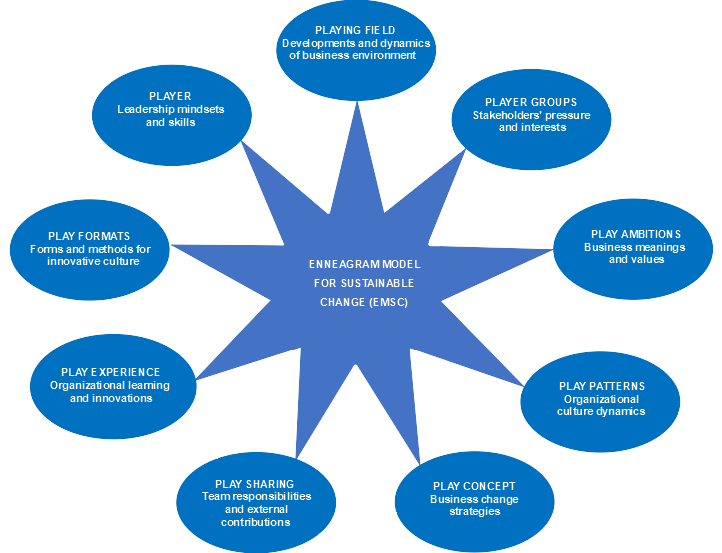Enneagram Model for Sustainable Change (EMSC) Assessment
The concepts of the Enneagram Model for Sustainable Change (EMSC) Assessment are presented in Chapter 3 of the book Liderança e Cultura Organizacional para Inovação (Leadership and Organizational Culture for Innovation), in which professors Jaap Boonstra and João Brillo present the Play Model, revealing 9 perspectives of sustainable changes in organizations and what mindsets and skills their leaders have in common to successfully implement them. The metaphor of Play Model concerning unknow and unforeseen environments can encourage reflections on the role of leadership in change processes and challenge people involved in these processes to develop qualities, making their organizational and personal targets come true.
This assessment is not a planned process of change with pre-defined targets, but a high-performance teamwork effort, where everyone works together with a positive outlook to implement sustainable changes. In this process, leaders recognize the dynamics related to change, make balanced choices in the changing context, question the team’s performance on the analyze stakeholder’s dynamics in the business environment, how they manage to create successfully changing organizations in a dynamic environment, point out what dynamic’s other players in organizations are facing and how they can shape change without losing themselves in those dynamics. Following are present the EMSC’s 9 perspectives.

Using the following assessments you will be able to discover your strengths and weaknesses to develop the 9 MEMS perspectives.
Enneagram Model for Sustainable Change Assessment – Individual Free Format
The result of this assessment comprises:
- Self-Assessment;
- Website Database Average comparison;
- Website Database Excellence Benchmark comparison;
- Get free the Action to Develop your most critical Perspective for Sustainable Change.
Enneagram Model for Sustainable Change Assessment – Format for Groups and Organizations
Because this assessment format brings the perception of others about your behavior in your day to day work, it can contribute more effectively to your development in the 9 Perspectives for Sustainable Change. The result of this assessment comprises:
- Self-Assessment;
- Group Database;
- Group Assessment (average of your assessment by the group members);
- Excellence Benchmark (position of the highest rated in the group);
- Actions to Develop all 9 MEMS perspectives.
